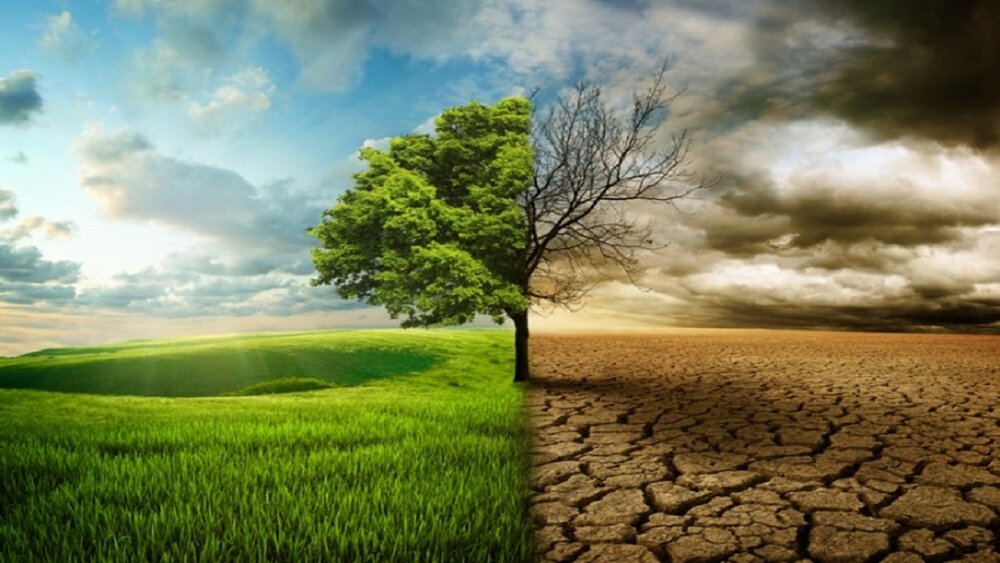Two decades of struggling with climate change

TEHRAN – Over the past 23 years, climate change has led to dryness of lakes and wetlands, land subsidence, sand and dust storms, air pollution, and some other predicaments in Iran.
The consequences of industrial life in the country caused a special condition that when heavy rainfall begins, the lands being unable to absorb it, flooding rages across the county, Reza Shahbazi, deputy head of Geological Survey and Mineral Exploration said.
Iran is currently in a period of prolonged drought, yet during this period occasionally experienced heavy rainfall over short periods of time, he stated.
Examination of indicators such as rainfall, the difference with long-term averages, and evaporation rate, shows that our country has been in a period of drought since 1998, however, over some years, normal averages of rainfall poured over the country, he added.
Referring to rainfall fluctuations, he explained that sometimes an area received a year of rainfall only in a few days, as it has recently rained as much as a year in one day in Bushehr.
Today we face a series of extreme, and abnormal events that can be a sign of "climate change" and the nature of climate change is creepy and its gradual occurrence, so that the exact time of these events and changes cannot be understood, he highlighted.
“Since the beginning of the twentieth century and the increasing use of fossil fuels in the world, the average carbon dioxide in the atmosphere has risen from 250 ppm to more than 400 ppm, and this 1.7-fold increase in carbon dioxide is directly related to rising global temperatures and events such as torrential rains, dust, etc.
About 60 years ago, Iran has moved towards industrialization, during which the pressure on water resources and lands with all kinds of exploitation has increased, and today we are witnessing the destruction of land in the form of water and soil erosion, as well as vegetation depletion.
In exchange for this destruction and excessive exploitation, nature has not been able to regenerate itself, so that it reacts with natural incidents,” he further lamented.
Implementation of watershed, rangeland, desertification management in the plains can be effective in reducing natural incidents risks in the short and medium-term.
Dam construction and dredging of waterways alone cannot be effective in flood management.
Climate change impact
Increasing consumption of fossil fuels by humans, especially after the Industrial Revolution, has led to an increase in greenhouse gas emissions and ultimately climate change, and now tackling this phenomenon has become one of the most important concerns worldwide.
One of the most important challenges is climate change, known as the silent death of nature. In the future, a large part of the desert areas of the country will lose their capabilities. On the other hand, we will face forced wildlife migration.
Climate change is one of the most important problems in Iran that can exacerbate drought and water stress, so it is necessary to make serious plans at the national level to address the phenomena.
Based on research and assessments conducted by Action for Climate Empowerment (ACE) adopted by the United Nations Framework Convention on Climate Change (UNFCCC) and using scenarios proposed by the Intergovernmental Panel on Climate Change (IPCC), if the concentration of carbon dioxide doubles by 2100, Iran's average temperature will increase by 1.5 to 4.5 degrees Celsius.
Temperature change, sea-level rise, coastal degradation, destruction of agricultural and food products, deforestation, depletion of freshwater resources, regional climate change in the high and northern hemispheres, changes in rainfall and wind direction, rising natural disasters such as tornadoes and floods, intensifying droughts and developing desert areas, increasing air pollution due to rising hot winds and the potential impact on the spread of diseases such as malaria are some of the known consequences of climate change.
According to scientists, global warming due to climate change is one of the biggest challenges of the 21st century.
FB/MG
